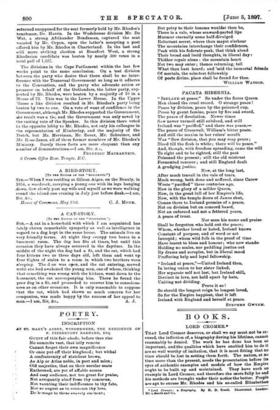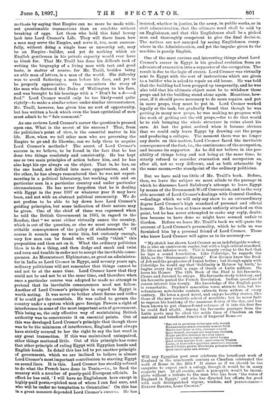BOOKS.
LORD CROMER.*
THAT Lord Cromer deserves, or shall we say must not be ex- cused, the infliction of, a biography daring his lifetime, cannot reasonably be denied. The work he has done has been so important, and the qualities which have enabled him to do it are so well worthy of imitation, that it is most fitting that no time should be lost in setting them forth. The nation, at no time more than the present, needs the presentation before its eyes of authentic examples and models of how the Empire ought to be built up and maintained. They have such an example in Lord Cromer, and therefore the nrore fully he and his methods are brought under their notice the better. People are apt to excuse Mr. Rhodes and his so-called Elizabethan
• Lord Crow a Biography. By H. D. Trodll. Illustrated- London: Sande and Cu.
methods by saying that Empire can no more be made with- out questionable transactions than an omelette without breaking of eggs. Let those who hold this fatal heresy look into Lord Cromer's Life. They will there learn how a man may serve the Empire, and serve it, too, most success- fully, without doing a single base or unworthy act, may be an Empire - builder, and yet do nothing which an English gentleman in his private capacity would ever have to blush for. That Mr. Traill has done his difficult task of writing the biography of a living man with tact and good taste, is matter of course, for Mr. Traill, besides being an able man of letters, is a man of the world. His difficulty was to avoid flattering a man before his face, and yet to be properly appreciative. One remembers the story of the man who flattered the Duke of Wellington to his face, and was brought to his bearings with a " Don't be a d—d fool." Lord Cromer would only be too likely—and quite rightly—to make a similar retort under similar circumstances. Mr. Traill, however, has given him no sort of opportunity, but has written a book which even the least egotistical of men must admit to be " fair comment."
As one reviews Lord Cromer's career the question is pressed upon one, What is the secret of his success ? That, from the politician's point of view, is the essential matter in his life. How, when we tell other men who are governing the Empire to go and do likewise, can we help them to acquire Lord Cromer's methods ? The secret of Lord Cromer's success is, we believe, to be found in the fact that he has done two things resolutely and consistently. He has kept one or two main principles of action before him, and he has also kept his eye always on the object. That is, he has, on the one hand, not drifted into mere opportunism, and on the other, he has always remembered that he was not experi- menting in a political laboratory, but working with and on particular men in a particular country and under particular circumstances. He has never forgotten that he is dealing with Egypt in the year 1897 or whatever year it may have been, and not with an abstract political community. We do not profess to be able to lay down here Lord Cromer's guiding principles, but some indication of their nature may be given. One of the chief of these was expressed when he told the British Government in 1883, in regard to the Soudan, that " we must either virtually annex the country, which is out of the question, or else we must accept the in- evitable consequences of the policy of abandonment." Of course it sounds easy to write this, but curiously enough, very few men can be found who will really "think" this proposition and then act on it. What the ordinary politician likes is to do a thing, and then dodge and sneak and twist and turn and tumble in order not to accept the inevitable conse- quences. As Mountstuart Elphinstone, as great an administra- tor in India as Lord Cromer in Egypt, said seventy years ago, ordinary politicians will not remember that things cannot be and not be at the same time. Lord Cromer knew that they could not be and not be at the same time, and therefore when once a particular course was adopted he made no attempt to pretend that its inevitable consequences need not follow. Another of Lord Cromer's principles in regard to Egypt is worth noting. It was never to bother about forms and trifles if he could get the essentials. He was called to govern the country under a system which gave foreign Powers a right of interference in some of the most important acts of government. This being so, the only effective way of maintaining British authority was to concentrate it on essential points. Out of this was developed Lord Cromer's principle that though there was to be the minimum of interference, England must always have strictly secured to her the right to say the last word in any great transaction. If this was maintained unimpaired, other things mattered little. Out of this principle has come that other principle of ruling Egypt with Egyptian hands and English heads. In detail this has led to yet another principle of government, which we are inclined to believe is almost Lord Cromer's most important contribution to starting Egypt on sound lines. It is this. Lord Cromer has steadily refused to do what the French have done in Tunis,—i.e., to flood the country with a number of poorly-paid European officials. In effect he has said, I will have no Englishmen here except in highly-paid posts,—picked men of whom I can feel sure, and who will be under no temptation to Orientalise.' On this has in a great measure depended Lord Cromer's success. He has insisted, whether in justice, in the army, in public works, or in civil administration, that the ultimate word shall be said by an Englishman, and that this Englishman shall be a picked man and thoroughly competent to give the final decision. The natives are not annoyed by seeing Englishmen every-
where in the Administration, and yet the impulse given to the machine is purely English.
One of the most curious and interesting things about Lord Cromer's career in Egypt is his gradual evolution from an advocate of evacuation into a supporter of the occupation. The result is due to the logic of events. Lord Cromer was virtually sent to Egypt with the sort of instructions which are given to a builder who is asked to repair an old house. He was told that the building had been propped up temporarily, and he was also told that his ultimate object must be to withdraw those props and let the building stand alone again. Meantime, how- ever, if it should prove necessary to do more repairs and put in more props, they must be put in. Lord Cromer worked loyally at the task, but gradually found that though he was putting in many new props, he was making no progress with the work of getting out the old props,—for to do that would be to risk bringing the whole structure in ruins about his ears. At last the point arrived when it became obvious that we could only leave Egypt by drawing out the props and producing a collapse. The moment there was no longer any doubt on this matter, Lord Cromer faced the inevitable consequences of the fact, i.e., the continuance of the occupation, and became its supporter. As he did not believe in the pos-
sibility of things being and not being at the same time, he utterly refused to consider evacuation and occupation as, after all, not so very different, and as both attainable by the same means,—the standpoint of the ordinary politician.
But we have said too little of Mr. Trail's book. Before, then, we leave the subject we must allude to the passage in which he discusses Lord Salisbury's attempt to leave Egypt by means of the Drummond-Wolff Convention, and to the very able account of Lord Cromer's dealings with General Gordon, —dealings which we will only say show to an extraordinary degree Lord Cromer's high standard of personal and official honour. He has been at times most unfairly attacked on this point, but he has never attempted to make any reply, doubt- less because to have done so might have seemed unfair to Gordon. Before we leave Mr. Traill's book we will quote the account of Lord Cromer's personality, which he tells us was furnished him by a personal friend of Lord Cromer. Those who know Lord Cromer will agree as to its accuracy :—
" My sketch has shown Lord Cromer as an indefatigable worker. He is also an omnivorous reader, but with a high critical standard. He likes no inferior work. This is largely owing to the fact that he lays a sound foundation. Like Coleridge, he regards the Bible as the Statesman's Manual.' Few divines know the Book of Job and the prophecies of Isaiah better ; but though again with Coleridge he would say that Sublimity is Hebrew by birth,' he begins every day with a page of Greek or Latin authors. He loves his Homer. The 12th Book of the Iliad is his favourite, Cicero and Juvenal he enjoys. His favourite study is history, and his favourite period the French Revolution. Indian questions of course interest him keenly. His knowledge of the English poets is remarkable. Dryden's masculine verse attracts him, but his voluminous note-books contain extracts from writers of every century. He loves a good novel, and enjoys healthy stories, like those of the new romantic school of novelists ; but he never fails to express his loathing of the nauseous fiction of the day, and has been known to put chance-found volumes of it into the first fire he could find alight. Among his favourite passages from the Latin poets may be cited the noble lines of Claudian on the maternal and beneficent function of Imperial Rome Theo est in gremium victos gum sole recepit Humannmque genes communi nomine tovit hlatris non donuts) ritu, civesque creavit Quos domuit, nexnque pio longtnqua revinsit Hujus pacifists debemus mot thus °roues Quod veluti patris regionibus utiter hospes Quod sedem mutare licet ; quod cernere Tbitlem Luaus, et borrendos quondam penetrare mamas Quod bibimus passim Rhodanum potamus Orontem Quod cuncti gene una sumus.'
Will any Egyptian poet ever celebrate the beneficent work of England in the nineteenth century as Claudian celebrated the work of Rome in the fifth t It seems as if we should be too sanguine to expect such a eulogy, though it would be in many respects just. At all events, such a panegyric would be incom- plete without a tribute to the man who has been 'the voice of England in Egypt,' and who has directed her efforts for good with such distinguished vigour, wisdom, and pereeverance-
EVEnYN BARING, LORD CROMER."







































 Previous page
Previous page